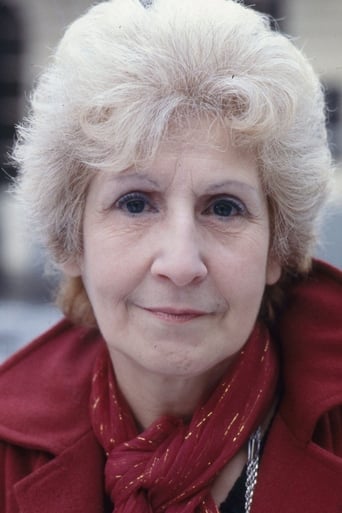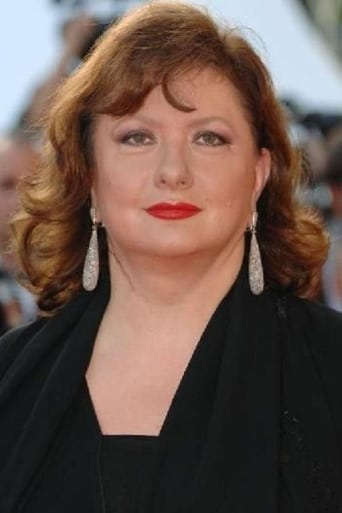MartinHafer
Wow did I like this movie!! This is the story of a nasty old lady who treats everyone like her servants and pretty much hates everyone. She is not one of these cute or grandmotherly type old ladies, that's for sure! Her absolute awfulness is not reason enough to watch the movie--after all, it would hardly be engaging to JUST watch a movie of a horrible person. Instead, the writers really manipulate the viewer into ALMOST liking her or seeing something of value in this old crank--and THEN, she becomes even worse than you'd imagined! Its unrelenting cynicism is great. This movie reminded me of a much better written version of Problem Child with one MAJOR exception. In Problem Child, they had a cop-out ending when the rotten child's heart changed and he realized he really DID love his adopted dad. That NEVER rang true in Problem Child and Tatie Danielle never gives in to cheap sentimentality. It is funny and irreverent and very unusual to say the least.I remember the tagline of the movie when it came out roughly translated to "you don't even know her but she hates you already". Wow--this really sums up the old crow!By the way, what ever DID happen to the dog,....?
alice liddell
A slight, eventually monotonous fable that is frequently very very funny. Its use of the medium may be rudimentary, and its general conceit - an old woman is a real pain to her family - hardly complex, but there is a real pleasure in seeing sheer, unwarranted nastiness in action. Tatie Danielle is the kind of wearingly negative OAP we all hope we'll grow up into.The movie starts with Danielle being generally unpleasant to her equally elderly servant-companion, Odile, in a monstrous parody of the Barbie/Mabel relationship in THE JEWEL IN THE CROWN. They share a large house outside Paris - Odile doing all the chores to a chorus of ingratitude and hostility; Danielle accusing her of senility and thieving . A short visit from her nephew, Jean-Pierre's family, inspires in Danielle the desire to live with them in Paris, and fortuitously (or is it?) Odile meets with a fatal accident cleaning the chandelier on a rickety chair. Danielle sells her house, shares the money with her nephew and spinster niece, Jeanne, to ensure moving in with the former.Here, she is an absolute horror, refusing to eat at dinner, insulting Jean-Pierre's wife, Catherine's cooking and looks, kicking the dog, deliberately losing the youngest child in the park. The family refuse to believe she is mean because of her financial generosity, but the barrage begins to wear. Just before they intend to holiday in Greece, with Danielle staying with Jeanne, the latter is dumped by her boyfriend when she announces her pregnancy; Jean-Pierre suggests she accompany them: a helper must be found for Danielle.Outraged, Danielle ups her offensive. She begins to overeat to get sick, and throws water on the bed, feigning wetting. In a brilliantly farcical sequence, she disrupts her nephew's dinner with friends by turning on the TV at a blaring volume, begging for food and visibly defecating in her nightie. Eventually the family find a minder, Sandrine, and set off. But Sandrine refuses to take any nonsense, and after a power struggle and touching thawing , leaves Danielle to spend a last night with her American boyfriend. Left alone, Danielle deteriorates, lets the apartment go to pot, and sets it on fire. A national outrage ensues over this perceived abandonment and Danielle becomes a celebrity, while the family are taken to court for negligence. Her fraud is revealed, though, and she ends up in an old folks' home...TATIE is very reminiscent of Renoir's masterpiece BOUDU SAUVE DES EAUX, in which a tramp rescued by a kindly bourgeois wreaks havoc on his benefactor. Danielle, for all her unpleasantness, is a subversive presence, disrupting complacent bourgeois domesticity, telling hard truths. The family aren't vile money-grabbers, and despite some grotesqueness, are an essentially decent lot. They are the new France, boasting shiny apartments with all mod cons, and bright colour schemes, tolerant liberal attitudes (one son is a gay dancer), dinner parties, trips to Greece. Their only crimes are pretentiousness, homogeneity (note the similarity of their names), and self satisfaction, but they are hardly Bunuellian monsters.Danielle is the France they'd like to forget, reminder of a colonialist and collaborationist past. Her childlessness is linked to sterility and the pinched nature of her character; her husband died 50 years ago, just before the Fall of France? He is a seeming image of French glory and military prowess undermined by his comic looks. She is a past that refuses to be suppressed and her power reveals the fragility and superficiality of bright, modern, consumerist France, how easily it can descend into chaos and fragmentation. Catherine becomes a bag of nerves, Jean-Pierre convenes Mafia-like meetings to discuss family crises.TATIE is very brave in never selling out on the character of Danielle, who, in Hollywood, would surely be reduced to mush. There is as much ridicule as pathos in her conversation with her dead husband, and her growing affection for the only character who won't cow before her is disabled by a lack of human sympathy and insight. We love Danielle precisely because she is so unbearable, a vile Id that cannot be swept away. Tsilla Chelton's sublime performance, a mixture of evil, moroseness, regret and childish mischief, keeps the film watchable, although by the end one has probably had enough. The coda is delightful, though, rejecting cosy ideas of moral regeneracy. The style is more subtle than it first appears, with its plays of light and space serving to suffocate Danielle in her environment, and there are some pleasant, if conventionally mild, surreal long shots, involving an adorable, soon-to-be-betrayed dog.




